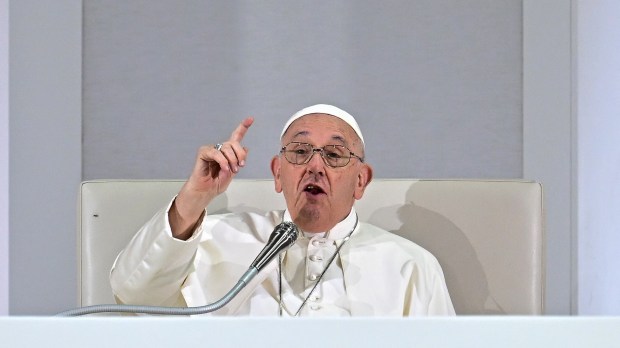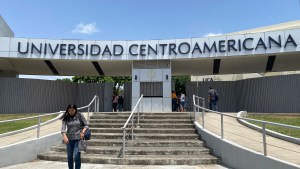“Everyone has their own space in the Church,” insisted Pope Francis in his exchanges with Jesuits he met in Portugal on August 5. In a conversation made public by La Civiltà Cattolica on August 28, 2023, the Pope spoke in particular about welcoming those with homosexual attraction into the Catholic Church.
[Note: An English translation of the full transcript has been made available here.]
Also, recalling the need for Christians to make an “examination of conscience,” he once again denounced clericalism and what he termed a “very strong reactionary attitude” in the United States.
As has become tradition on his foreign trips, the Pope took the opportunity to meet behind closed doors with members of the local Society of Jesus, his own spiritual family. The question-and-answer session between the Jesuits and the former Society member was published a few weeks later in the Jesuit magazine La Civiltà Cattolica.
In this conversation, a Portuguese Jesuit working in a student environment tells the Pontiff that some young homosexual Catholics do not consider, “in conscience,” that their relationships are sinful. “Can we say that they are all in error?” he asks the Pope. On this subject, the Catechism of the Catholic Church explains that “homosexual acts are intrinsically disordered” and calls homosexual persons “to chastity.”
“It is clear that today the issue of homosexuality is very strong,” Pope Francis acknowledges. “But what I don’t like at all, in general, is that we look at the so-called ‘sin of the flesh’ with a magnifying glass, just as we have done for so long for the sixth commandment [“Thou shalt not commit adultery,” Editor’s note].”
The Pope goes on to denounce a certain hypocrisy that may have permeated the Church: “If you exploited workers, if you lied or cheated, it didn’t matter, and instead sins below the waist were relevant,” he laments.
For the Pontiff, it’s a question of applying “the most appropriate pastoral attitude” to each individual. He also insisted that it’s not a question of being “naive” or “superficial” by “forcing people into things and behaviors for which they are not yet mature, or are not capable.” He adds that spiritual and pastoral accompaniment “takes a lot of sensitivity and creativity.”
Pope Francis’ words echo those he uttered 10 years earlier on the plane bringing him back to Rome from World Youth Day in Rio de Janeiro. Responding to a journalist, he expressed his pastoral approach to homosexuals: “If a person is gay and seeks the Lord and has good will, well who am I to judge them?”
Pope Francis also reminds the Portuguese Jesuits that he has invited transsexuals to come to the general audiences at the Vatican. “The first time they came, they were crying. I was asking them why. One of them told me, ‘I didn’t think the pope would receive me!’”
Examination of conscience, a weapon against pornography and clericalism
Asked how religious can face up to the challenge of a consumerist society where sexuality is everywhere, the Pope replies that he is not afraid of this “sexualized” society, but of “how we relate to it.” Faced with these emerging problems, the head of the Catholic Church offers an Ignatian remedy: “examination of conscience” to “see what’s going on inside you.”
Referring back to a speech he had made to the priests of the Roman Curia, he repeated the question he asked then: “‘Here is something that hasn’t been mentioned, the use of cell phones and pornography on cell phones. How many of you watch pornography on your cell phones?’ After I said that, they told me that one commented, ‘You can see that he has spent hours in the confessional.’”
In the course of their questions and answers, the Pope repeatedly stressed the need for a “serious examination of conscience” on a daily basis, in order to remain “alert.”
As is often the case, he warned against “clericalism” and “worldliness” creeping into consecrated life. He also repeated that lay people can also fall into these ways, and he adds that “clericalized laity are frightening.”
Pope Francis also stressed the importance of prayer, not hesitating to use colorful images to illustrate his point. “When a Jesuit does not pray, he becomes a desiccated Jesuit. In Portugal one would say he has become a baccalà, a dried and salted codfish.”
Doctrine is not a monolith
Asked by a Jesuit who, after spending a year of sabbatical in the United States, laments the criticism of Pope Francis by some American bishops, the latter admits that the situation in the United States is “not easy.”
“There is a very strong reactionary attitude,” he said. “It is organized and shapes the way people belong, even emotionally. I would like to remind those people that indietrismo (being backward-looking) is useless and we need to understand that there is an appropriate evolution in the understanding of matters of faith and morals.”
As he has done in the past, the Pope rephrased the words of St. Vincent of Lérins, who wrote in the 5th century: “Doctrine also progresses, expands and consolidates with time and becomes firmer, but is always progressing.”
To illustrate his point, the Pope cites the fact that slavery, once tolerated by certain popes, is no longer tolerated, just as the death penalty should no longer be practiced. “The view of Church doctrine as monolithic is erroneous,” he insists.
“The Synod is not my invention”
At the end of the conversation, Pope Francis spoke about the joy he finds in preparing for the Synod on the future of the Church. With the first Roman session due to open in October, the Pope reminds us that he is not the creator of these assemblies. “It was Paul VI,” he says, “at the end of the Council who realized that the Catholic Church had lost the sense of synodality.”
He warns against misinterpreting synodality as a democratic process. “Synodality is not about going after votes, as a political party would,” he stressed, insisting on the importance of “letting the Spirit lead things.”



